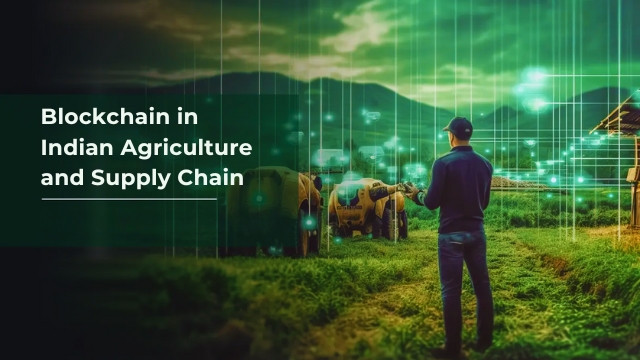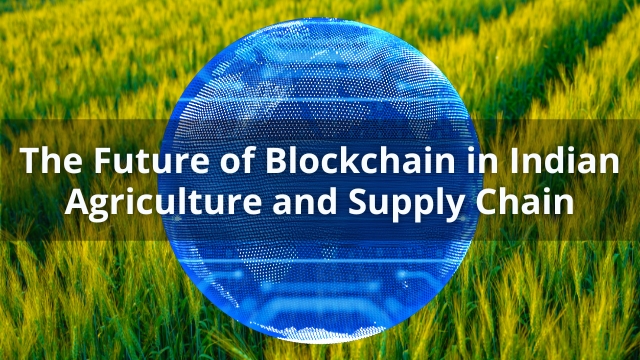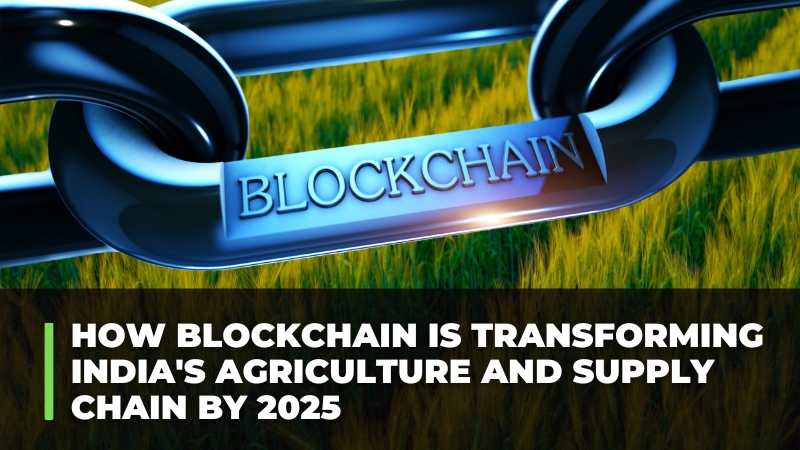India’s agricultural sector, contributing nearly 18% to the GDP and employing over 50% of the population, is undergoing a digital revolution. Blockchain technology offers a decentralized and immutable ledger that can solve critical issues like supply chain inefficiencies, food fraud, and farmer exploitation.
This article delves into how blockchain is transforming India’s agriculture and supply chain by 2025, ensuring a future marked by trust, efficiency, and sustainability.
Blockchain in Indian Agriculture and Supply Chain

Blockchain, a distributed digital ledger, records transactions across multiple computers to ensure transparency and prevent tampering. In agriculture, it enables farmers, suppliers, and consumers to trace the journey of food from farm to fork. By 2025, blockchain adoption in India’s agriculture sector is expected to streamline processes, reduce costs, and build trust among stakeholders.
Enhancing Supply Chain Transparency
Blockchain ensures end-to-end transparency in the supply chain. Each participant, from farmers to retailers, can access verified information, reducing fraud and miscommunication. This transparency builds consumer trust, as they can verify the authenticity and origin of their food products.
Improving Traceability and Food Safety
Traceability is crucial for ensuring food safety. Blockchain enables real-time tracking of agricultural products, helping identify and recall contaminated items quickly. By 2025, India’s food safety standards will benefit from blockchain’s ability to trace the source of contamination within minutes, protecting public health and reducing economic losses.
Key Benefits:
- Rapid identification of contamination sources
- Enhanced compliance with food safety regulations
- Reduced food fraud and adulteration
Empowering Farmers Through Direct Market Access
Blockchain platforms connect farmers directly with consumers and retailers, eliminating middlemen who often exploit them. Smart contracts automate transactions, ensuring farmers receive fair prices instantly. By 2025, more Indian farmers will benefit from improved income and market access, boosting rural economies.
Case Study:
A blockchain-enabled marketplace allows a farmer in Punjab to sell wheat directly to a bakery in Mumbai. The transaction is executed via a smart contract, ensuring the farmer receives immediate payment upon delivery.
Streamlining Agricultural Supply Chains
India’s agricultural supply chains are often plagued by inefficiencies, delays, and high costs. Blockchain optimizes these processes by providing real-time data on inventory levels, shipment status, and product quality. This reduces wastage, improves logistics, and enhances overall supply chain efficiency.
Key Features:
- Real-time tracking of shipments
- Automated payments and settlements
- Reduced paperwork and administrative costs
Ensuring Sustainable and Ethical Practices
Consumers are increasingly demanding sustainably sourced food. Blockchain verifies sustainable and ethical practices, enabling consumers to make informed choices. By 2025, India’s agricultural exports will benefit from enhanced credibility, meeting international standards and expanding global market access.
Sustainability Metrics Tracked:
- Carbon footprint of agricultural products
- Use of eco-friendly farming practices
- Fair labor conditions and ethical sourcing
Government Initiatives and Regulatory Support
The Indian government is actively promoting blockchain adoption in agriculture. Initiatives like the National e-Governance Plan in Agriculture (NeGPA) and blockchain pilot projects are paving the way for widespread implementation. By 2025, regulatory frameworks will further encourage blockchain integration, ensuring standardized practices and data security.
Key Government Programs:
- Digital India initiative promoting blockchain adoption
- Blockchain-based land record management systems
- Collaboration with agritech startups to develop blockchain solutions
Challenges and Solutions in Blockchain Adoption
Despite its potential, blockchain adoption in India’s agriculture sector faces several challenges. Addressing these barriers is essential for widespread implementation by 2025.
Challenges:
- Limited digital literacy among farmers
- High initial implementation costs
- Integration with existing supply chain systems
Solutions:
- Government subsidies and training programs for farmers
- Affordable blockchain solutions tailored for small-scale farmers
- Collaborative platforms integrating traditional supply chains with blockchain
The Future of Blockchain in Indian Agriculture and Supply Chain

By 2025, blockchain will be a cornerstone of India’s agricultural supply chains, ensuring transparency, efficiency, and sustainability. Farmers will enjoy fair prices and direct market access, while consumers will benefit from safe and ethically sourced food. With government support and technological advancements, blockchain will drive India’s agricultural sector toward a future of trust, innovation, and prosperity.
Conclusion
Blockchain technology is poised to revolutionize India’s agriculture and supply chain sectors by 2025. Its ability to enhance transparency, traceability, and efficiency benefits farmers, consumers, and businesses alike. With continued government support and technological advancements, blockchain will drive a future where India’s agricultural sector is more transparent, sustainable, and globally competitive.
Frequently Asked Questions About Blockchain in Indian Agriculture and Supply Chain
Q1. How does blockchain improve transparency in agriculture?
Answer: Blockchain creates an immutable digital ledger that records every transaction in the supply chain, ensuring transparency and preventing fraud. Stakeholders can verify the authenticity and origin of agricultural products in real time.
Q2. Can blockchain help reduce food wastage in India?
Answer: Yes, blockchain enables real-time tracking of agricultural products, reducing delays and spoilage. Improved supply chain efficiency ensures that food reaches consumers faster, minimizing wastage.
Q3. What role do smart contracts play in agriculture?
Answer: Smart contracts automate transactions between farmers, suppliers, and consumers. They ensure timely payments and enforce agreements without intermediaries, promoting fairness and efficiency.
Q4. Is blockchain affordable for small-scale farmers?
Answer: While initial implementation costs can be high, government subsidies and affordable blockchain solutions are making the technology accessible to small-scale farmers. Collaborative platforms also help reduce costs.
Q5. How does blockchain support sustainable farming practices?
Answer: Blockchain verifies sustainable and ethical practices, providing consumers with transparent information about the environmental and social impact of their food choices. This encourages farmers to adopt eco-friendly methods.
Disclaimer:
This blog post is for informational purposes only and does not constitute financial, legal, or investment advice. We do not guarantee accuracy, reliability, or security. Any actions taken based on this content are at your own risk. Always conduct your own research and consult a professional before making decisions.

